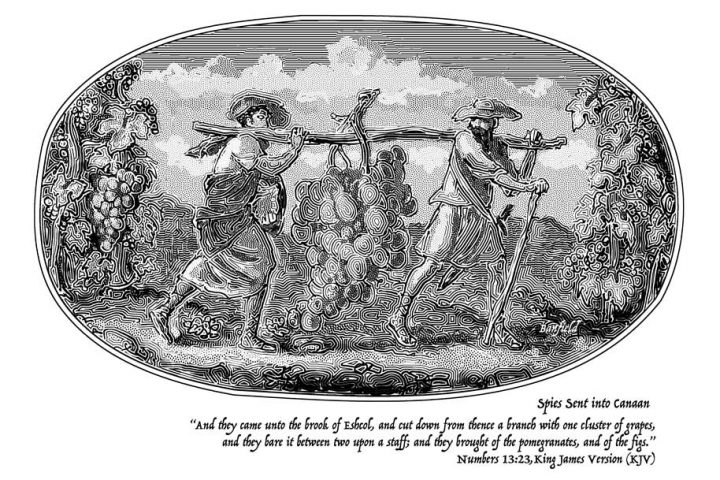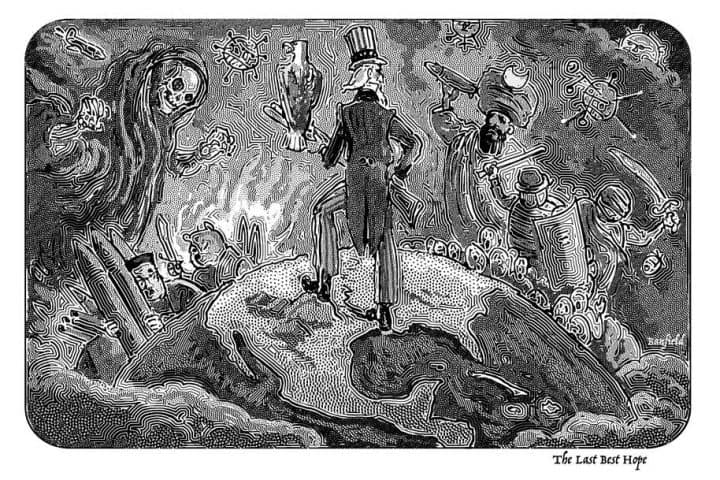Books Reviewed
“Never since the fall of Lucifer has a fall equaled his,” was the verdict of Nathanael Greene on his comrade-turned-traitor, Benedict Arnold. Arnold’s 1780 defection to the British during the depths of the Revolutionary War seemed cosmic for several reasons. It was serious: Arnold’s plot to give the enemy West Point, and thus control of the vital Hudson River corridor, could have aborted independence. It was shocking: before he switched sides, Arnold had been America’s most brilliant tactician. Time has been unkind to him. Unlike the men in gray, Arnold has lacked regional or ideological apologists (most Americans who were active loyalists became Canadians).
Stephen Brumwell and Joyce Lee Malcolm are not pro-treason. But each tries to soften, as much as possible, Arnold’s reputation. Brumwell, a prize-winning independent scholar, has written the more academic book: detailed, crisp. Malcolm, a professor at the Antonin Scalia Law School at George Mason University, writes warmly and passionately. They cover the appropriate ground, make no crazy claims, and acknowledge that their (anti-)hero had other options besides the one he fatally chose. But in the end, the reader must find Arnold guilty as charged.
* * *
Arnold was born in 1741 in Norwich, Connecticut, the son of a merchant. Benedict had a good early education and was bound for Yale College, but those plans had to be scrapped when his father succumbed to drunkenness and debt. Malcolm writes well of the effects of this family tragedy: “Benedict had the bitter disappointment of a sudden collapse of his hopes, coupled with public shame…. If he was to acquire personal honor after this deep disgrace, [he] would have to earn it himself.”
The path to restored honor began in business. Arnold became first an apothecary and bookseller in New Haven, then a merchant, trading horses in Canada and sailing his own ships to the West Indies. His horse-trading made him familiar with upstate New York, where he would later lead troops. His merchant career included a duel in the Bay of Honduras with another ship captain who had insulted him; sensitivity to slights would characterize him throughout his life. He married well, to a New Haven sheriff’s daughter who would die after eight years of marriage. Brumwell sums him up on the eve of the Revolution thus: “Headstrong, hot-tempered,…tough, experienced, worldly wise, and long accustomed to giving orders.”
* * *
The war brought two and a half years of glory. He proved to be a peerless planner, fighter, and leader. In 1775 he joined Vermonter Ethan Allen in the capture of Fort Ticonderoga, though a dispute over command bred him enemies who would dog him for years (Arnold had the commission, Allen had the men). At year’s end he led an army across Maine, up the Kennebec River and down the Chaudière to the St. Lawrence—a wild route that had only been taken once before, by a British army engineer—and suffered his first wound, a bullet to his left leg, during a gallant, doomed attack on Quebec. When the British counterattacked down Lake Champlain in 1776, Arnold built a small fleet, sprung it from an ambush, and grappled so furiously with the larger enemy flotilla that the British had to abandon the offensive for the year.
In 1777 the British made a more determined push, with an elaborate three-pronged effort to split New York State, and hence the United States. Lord Howe would move north up the Hudson from occupied New York City, General John Burgoyne would move south from Montreal, and Colonel Barrimore St. Leger would swing from the west, via Lake Ontario, all converging on Albany. Much went wrong with this plan: Howe occupied Philadelphia instead, and St. Leger was mauled trying to take Fort Stanwix in western New York. But the decisive American blows were inflicted on Burgoyne in two autumnal battles near Saratoga: Freeman’s Farm and Bemis Heights. The American commander was Horatio Gates: cautious, by-the-book, jealous of rivals. But it was Arnold who led from the front. Years later, an old veteran remembered him at Bemis Heights: “He was dark-skinned with black hair, and middling height; there wasn’t any waste timber in him; he was our fighting general, and a bloody fellow he was. He didn’t care for nothing; he’d ride right in. It was ‘Come on, boys’—‘t wasn’t ‘Go, boys.’ He was as brave a man as ever lived.” Arnold’s left leg was injured again, by his dying mount collapsing on him, and by yet another bullet.
Victory at Saratoga encouraged France, which had been helping America on the sly, to become an open ally. Britain, girding for a world war, concentrated its forces in New York. Commander-in-Chief George Washington made the wounded hero military commandant of liberated Philadelphia. The occupation had exacerbated local political passions. A go-along, get-along elite had prospered while patriots suffered. Now that the wheel had turned, radical patriots wanted revenge. Arnold’s assignment was to keep the peace, which made him suspect in radicals’ eyes. American civil authorities generally were wary of all military leaders, having had bad examples throughout history, both ancient (Julius Caesar) and modern (Oliver Cromwell).
Arnold made matters worse by living well—he moved into the house of John Penn, the colony’s last proprietor—and by trying to recoup his fortunes as a merchant by doing a little business on the side. The Pennsylvania state government accused him of corruption, and an old enemy from his days in upstate New York and Canada pressed similar charges. Arnold bristled at his civilian detractors and demanded a court martial to exonerate him. In January 1780, after many delays, a court martial found Arnold guilty on two minor counts. In April, Washington wrote a firm, but regretful, reproof. Arnold had been in contact with British intelligence for 11 months.
* * *
Why? Brumwell and Malcolm sort through the traditional explanations, besides Arnold’s political troubles. For years Arnold had resented the slowness with which he had been promoted. High rank in the American army often went to the well-connected. Arnold himself would claim, after his treason, to abhor the French alliance, on the grounds that France was absolutist and Catholic (anti-Catholicism had not prevented him from trying to bring Catholic Canada into the Revolution, however). One traditional reason—Arnold’s marriage to his second wife Peggy Shippen, a young, high-class Philadelphia beauty—is endorsed by Brumwell, who accepts the consensus view that she knew, and approved, of her husband’s defection. Peggy was one of those Philadelphians who had enjoyed the occupation; one of her British admirers was a dashing young officer, Captain John André. Malcolm acquits Peggy of precocious disloyalty. Her best argument, made by one of Arnold’s aides, is that Peggy was so given to hysterics that she was never told anything important.
Both authors downplay a reason emphasized by enraged Americans when Arnold’s treason was fresh—greed for gain (anti-Arnold parades and cartoons featured devils proffering bags of gold). Yet Arnold, his biographers admit, needed money. He had spent out of his own pocket on the patriot cause, and the war had destroyed his merchant business. He carefully stipulated the rewards he expected from his new masters.
* * *
Arnold’s main reason for betrayal, both Brumwell and Malcolm argue, was his sense of wounded honor. He considered the slights he experienced to have been worse than lost opportunities. They were signs of disrespect. The biographers write intelligently about the role of honor in the 18th century and in the revolutionary army. Rebellious provincials needed to feel themselves peers of their professional enemies. Courts martial and duels—legal and extra-legal tests of rectitude—were regular features of American military life.
The power and pervasiveness of honor culture do not by themselves explain Arnold, however. All officers prized their honor, and many had grudges. Why did he almost alone switch sides?
Arnold’s honor seems to have been fatally self-contained. He was like Alcibiades, Coriolanus, or Plantagenet noblemen—a gentleman freelance. He professed concern for the greater good, and for causes larger than himself, but he himself defined what those goods and causes were. His commander, George Washington, thought and acted differently. Honor for him flowed from serving alongside one’s fellow Americans. The terms were set by the institutions that they, as free men, chose. Congress might be full of dolts and pettifoggers (sound familiar?). But there was no other source of authority, and hence no other source of honor.
* * *
Arnold’s handler, once he went over to the dark side, was John André, now a major in charge of British intelligence in New York. The plot Arnold and André devised was that Arnold should be posted to West Point, a fort 60 miles north of New York City with command of the Hudson. If, by weakening its defenses, he could allow the British to take it, the river would fall. What Burgoyne, Howe, and St. Leger had failed to accomplish could be done in one swoop. As an added bonus, the British might capture George Washington and his staff, due to visit West Point in the autumn of 1780. (Malcolm, ever loyal to Arnold, doubts this nefarious detail.) The plot, so glowing on paper, so risky in reality, faced a last-minute complication. The British wanted to be certain that the American with whom they had been dealing via coded letters and go-betweens was in fact Arnold. On a night in late September 1780 traitor and handler rendezvoused face-to-face at a spot about 16 miles below West Point. André, who had been brought to the meeting by boat, set off afterward for his own lines on horseback, with the plans of the fort stuffed in his boot. He was captured by ruffians who turned him over to the American army once they saw the importance of whom they had robbed. The officer in charge of the prize captive, not realizing whom André had gotten the plans from, promptly notified Arnold, who bolted for a British ship in the Hudson. Once aboard, he asked the American bargemen who had rowed him to join him in treason. “No, sir,” one replied, “one coat is enough for me to wear at a time.” Brumwell writes that this “uncompromising reaction was the first indication of just how badly Arnold had misjudged the mood of his countrymen; grumbling was one thing, outright defection quite another.”
Washington and his staff were staggered. Peggy succumbed to (or feigned) hysterics, and she was eventually sent to rejoin her husband. André was convicted of espionage by an American board of officers, and hanged. Arnold sent Washington a pair of letters, full of self-justification and bluster. The British let him raid Virginia and his native Connecticut, but after the Revolution ended, never gave him military employment again. He died in 1801.
A tradition among his descendants had it that in his final delirium he asked to put on his old American uniform. Too late.




